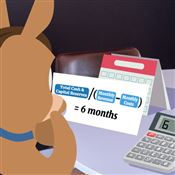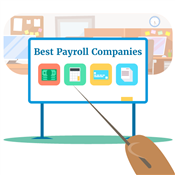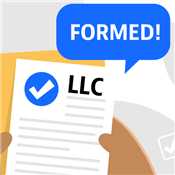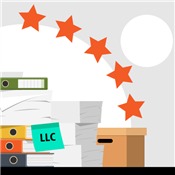Business Startup Calculator
Starting a business? Use this calculator to find out how much your startup costs will be. Plus, get a checklist of upfront and ongoing startup costs.
Ready to see your dream business take off? There's one thing you should do first.
Calculating your startup expenses is a crucial step that can't be skipped.
 |
In this article, you'll find out:
- How much you need to cover upfront expenses
- How much you need to cover ongoing monthly expenses
- How much to set aside for unexpected costs
Stick around to learn why tracking expenses is important, plus business tax deductions to look out for.
How to Calculate Startup Costs for Your Business
Wondering what it'll take to get your business up and running? Follow these steps to get a reliable estimate of your business startup costs.
- Make a list of the upfront costs needed to get your business off the ground.
- Add up the total of all upfront costs.
- Make a list of your estimated ongoing monthly costs.
- Multiply your ongoing costs (for 1 month) by the number of months you want to project (12 is good, 36+ is best).
- Then, add that number to your upfront costs to get your startup total.
- Finally, add an extra 25% of your startup total onto the sum.
- This is the full amount you'll need to start your business and keep it running for the number of months you defined, plus extra for unexpected/emergency expenses.
Small business owners spend $40,000 on average for their first year of business, according to a study by Shopify. That figure decreased to $18,000 for solo business owners with no employees.
Examples of Startup Costs
When calculating startup costs, where do you start? Here is a list of the most common startup costs for a business, separated into upfront and ongoing monthly costs.
Upfront Costs (One-Time)
- Security deposit/down payment on rental space
- Utilities deposits (internet, electricity, gas, water)
- Prepaid insurance (business insurance, rental insurance, etc.)
- Marketing costs (website creation, logo, signage, etc.)
- Licensing fees (federal and/or state business license)
- Legal fees (incorporation fees, business lawyer fee)
- Office equipment/supplies (machinery, storage, fridge, etc.)
- Furniture and fixtures (chairs, desks, tables, etc.)
- Computer hardware (monitors, keyboards, printers, etc.)
Ongoing Costs (Monthly)
- Rent or mortgage
- Employee salaries
- Owner salaries
- Supplies
- Utilities (internet, electricity, gas, water, etc.)
- Marketing (website fees, subscriptions, ads, etc.)
- Administration/operations
- Rental costs (storage, garage/parking, amenities, trash, etc.)
- Franchise fees (or other commissions)
- Insurance (general liability, commercial property, workers' comp, etc.)
Keep in mind: These expenses on this list don't necessarily apply to every business. And some businesses may have costs that this list doesn't cover.
Be sure to review your finances regularly to keep your list of expenses up to date and accurate.
Why It's Important to Track Startup Costs
Calculating startup costs is a crucial step to run a successful business. In fact, here's a just few things that keeping a detailed record of expenses can help you do:
- Estimate yearly profits: Knowing how much you might earn in profits starts with knowing how much you spend.
- Identify spending problems: Keeping a detailed record of expenses will ensure there are no surprises.
- Prepare to get a business loan: Most business loan applications require info regarding your business's finances, like yearly balance sheets.
- Appeal to investors: Investors will feel confident in your business if you already have a detailed record of startup expenses.
- Easily identify tax deductions: A formal record of your startup costs is easy to refer to when looking for tax deductions (more on this below).
34% of business owners say shipping/packaging costs were the biggest unexpected expense, followed by legal fees (23%), inventory/product costs (21%), and accounting/taxes.[1]
Tax Deductible Business Expenses
Running a business isn't cheap. Luckily, the IRS allows businesses to deduct many of their expenses when tax season rolls around.
When you have a list of your business expenses, you've already done most of the work. Review your own expenses and this list of potential deductions to spot ways to save money:
Startup expenses
You can deduct up to $5,000 of costs paid or incurred for (a) creating an active trade or business or (b) investigating the creation or acquisition of an active business[2]
Business insurance
Any insurance that serves a necessary business purpose should be eligible for deduction (general liability, workers' compensation, commercial real estate, etc.)
Advertising and marketing
Advertising/marketing costs are eligible if they're considered reasonable and necessary (business cards, flyers, print ads, influencer marketing, etc.)[3]
Rent
To be eligible, the property must be used for business purposes. If your rental expenses qualify, you can deduct up to 100%!
Employee pay and benefits
Employees must not be a sole proprietor, partner, or LLC member for you to claim this deduction; deductible benefits include paid time off, commission, salary, and bonuses.
Find more business deductions from the IRS website and Quickbooks.
Bottom Line
You've calculated your business startup costs, but it doesn't stop there! It's important to keep track of how your costs fluctuate with time and where potential changes can be made.
It's just like having a personal budget - it sets you up for success, helps you prepare for emergencies, and keeps you on top of your finances. Best of luck with your new business!
References
- ^ "Costs to Start a Business": Shopify, 2021.
- ^ "Business Start-Up Costs": IRS, 2021.
- ^ "Small Business Tax Deductions": Quickbooks, 2021.
- ^ "Deducting Business Expenses": IRS, 2021.
Holly Zorbas is a assistant editor at CreditDonkey, a credit card comparison and reviews website. Write to Holly Zorbas at holly.zorbas@creditdonkey.com. Follow us on Twitter and Facebook for our latest posts.
|
|
| ||||||
|
|
|













